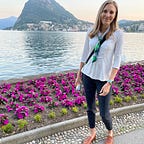Loose Stones
A rambling of thoughts on foundations
I recently visited my kids’ classrooms. Swiss schools have regular Besuchtage or visiting days when parents can drop in and have a peek into their children’s world. This was the first time I had been able to go post-Covid.
When I arrived at the school, all the children were out for a break. They were eating their snacks and buying treats from the bake sale run by one of the classes. I found my son hanging upside down on the playground equipment; we searched my pockets for coins so he could buy a muffin from the sale. We were 20 Rappen short. Then we found my daughter. She was sitting in a circle of friends, eating bake sale goods and chatting — she never forgets to bring spare change on bake sale days.
When the bell rang, I walked with my son to his class. I sat in the back while the teacher read a story and put a picture on the smart board. The children sat on the floor in the front of the class and searched the image to find hidden objects. Then they were split into their pairs and given papers. One child had a blank paper and the other a seemingly abstract drawing. The one with the drawing would describe the shapes and lines as the other attempted to recreate them blindly.
The pictures were simple, and the children did well at describing them. After the drawings were finished, the teacher placed them on the smart board and had them guess what they were. They had many ideas, but the realities were far outside their suggestions: a person wearing a sombrero riding a bicycle or four elephants sniffing a tennis ball was not the answers they had initially guessed.
Then they were each given a prompt to draw something in the classroom from a birds-ey view. They were changing their perspective to see it in a new way.
I was running out of time, so I hurried over to my daughter’s classroom. She had English class. As a native English speaker, this is her least favorite subject. She was playing a game matching the words like ‘bicycle’ to the picture with a partner. When the teacher struggled to find the word for fuel, my daughter sat silent as the other kids excitedly chimed in, working together, trying several words: benzine, gas, petrol, diesel. She later told me she didn’t know the word in English, and in almost passing, she mentioned she talks a lot more when it’s not English class.
As the only native English speaker in her class, this surprised me. How would class dynamic shift if every time the teacher or other students pronounced a word wrong or used poor grammar, she raised her hand and corrected them? Would it speed up the learning or hinder the environment?
As my daughter explained quietly to her partner that a rocket ship is faster than an airplane, I noticed whose empty desk I was sitting in. It was the seat of my daughter’s friend who had left in an ambulance two days before. He had screamed in pain and clutched his head while giving a presentation in class. The MRI showed a mass in his brain. I hadn’t yet found the words to tell my daughter.
As I walked down the stairs to leave, I thought of the privilege it was for my children to go to school and never have had an active shooter drill. I live in one of the countries with the highest gun ownership in Europe but don’t worry about gun violence.
The church in our town is currently under scaffolding. It was built in 1763 and has dragons on the clock tower. They have exposed the foundation, inspecting the stones laid upon each other nearly three centuries ago to find any weak places and shore them up. When they are satisfied the rocks are stable and the foundation sturdy, they will again cover the base of the church, confident it will stand for a hundred more years. A large sign on the scaffolding reads, ‘renovation is necessary to the Catholic Church.’
I love my country. I am proud to tell people I am American. I am raising my children as Americans. I know there are ensanguine moments in our history, but that does not make us unique. I walk past a flag on my way to my children’s school, hailing the arrival of Peter and Paul to found this sleepy alpine village. How we choose to face those moments in our contemporary world matters. Do we melt our statues down every hundred years? Frame our thoughts with contempt and suspicion for those who believe differently? Or do we look for loose stones and shore up our foundation together?
I don’t have any the answers. I can’t offer a bird’s-eye view, and I am by no means the expert. I can only think about how fragile life is. How I would go to the lengths of the world to protect my children. How I think every parent I’ve ever known would.
